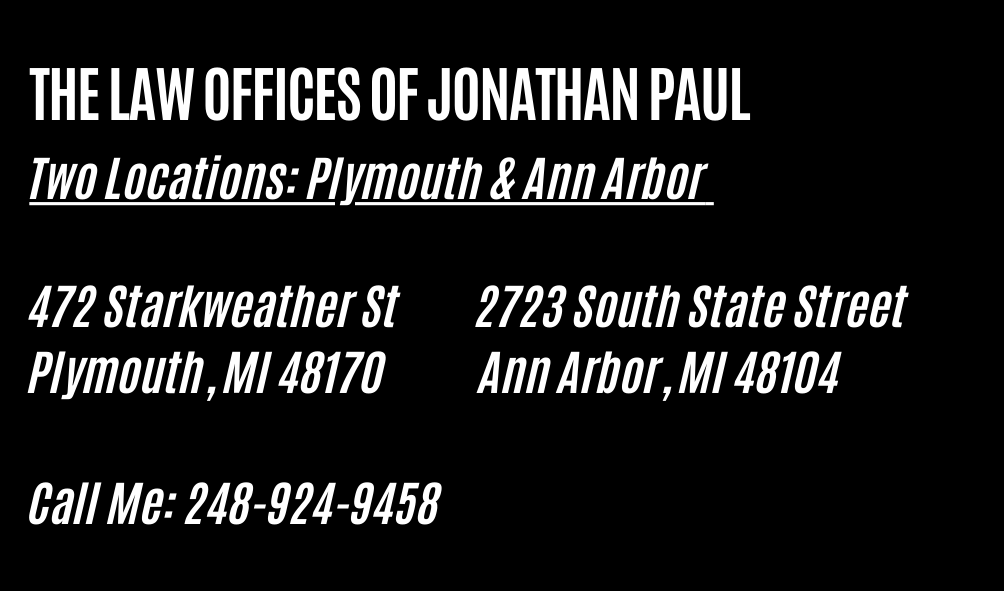Ann Arbor's 15th District Court buzzed with activity, a tableau of individuals from diverse walks of life waiting for their moment before the judge. Among them, Chloe, a 26-year-old graduate student, sat nervously, eyes darting around, every ounce of her being absorbed by regret. Today, she was charged with retail fraud – shoplifting.
Chloe was an exemplary student, engaged in community service, and known for her kindness. The theft was a mystery even to her, a divergence from the straight path she'd always walked. She'd never been in trouble before, but one momentary lapse, fueled by stress and personal struggles, had threatened to mar her future. Chloe's dreams of securing a respectable job, one that demanded trust and integrity, seemed to be in jeopardy.
Enter Attorney Jonathan Paul, a man known in the Ann Arbor legal community not just for his legal prowess, but for his empathy and genuine concern for his clients. As soon as they met, Chloe felt a weight lift off her shoulders. She wasn’t just another case number; she felt understood.
Jonathan dove into Chloe's case with vigor, seeking more than just a legal resolution. He wanted to understand the underlying issues that drove her to act out of character. Through their discussions, they uncovered layers of stress and unresolved emotions Chloe had been suppressing.
Rather than just formulating a legal defense, Jonathan designed a comprehensive plan to help Chloe holistically. He connected her with a therapist who specialized in stress management. He engaged her in community service programs, letting her channel her regret into something positive. And he introduced her to meditation groups in Ann Arbor, where she could learn mindfulness and self-awareness.
In the courtroom, Jonathan’s approach was multi-pronged. He presented Chloe's good character, her academic accomplishments, and her genuine remorse for the incident. He argued for alternative sentencing, highlighting the therapy and community service Chloe had voluntarily engaged in since the incident. With his guidance, Chloe navigated the complicated waters of the legal system, articulating her side of the story with vulnerability and honesty.
The prosecutor and judge acknowledged Chloe's previous good record and the steps she'd taken post-incident. With Jonathan's compelling representation, Chloe received a diversion program, ensuring that upon its completion, her record would remain clean.
But the journey didn't stop in the courtroom. Jonathan continued to mentor Chloe, setting aggressive goals for her mental, emotional, and physical well-being. Chloe thrived. She not only completed her diversion program but also went on to organize mindfulness workshops for stressed students, turning her lowest point into an initiative to help others.
Months later, as Chloe reflected on her journey, she felt a sense of gratitude. The incident, which had once seemed like the end of her dreams, had in fact paved the way for self-growth, introspection, and transformation. With Jonathan's help, she had come to believe that our darkest moments can lead us to our most illuminating crossroads.
In the heart of Ann Arbor, a story of redemption unfolded, proving that with the right guidance, empathy, and resilience, second chances aren't just possible—they can be transformative.
Chloe was an exemplary student, engaged in community service, and known for her kindness. The theft was a mystery even to her, a divergence from the straight path she'd always walked. She'd never been in trouble before, but one momentary lapse, fueled by stress and personal struggles, had threatened to mar her future. Chloe's dreams of securing a respectable job, one that demanded trust and integrity, seemed to be in jeopardy.
Enter Attorney Jonathan Paul, a man known in the Ann Arbor legal community not just for his legal prowess, but for his empathy and genuine concern for his clients. As soon as they met, Chloe felt a weight lift off her shoulders. She wasn’t just another case number; she felt understood.
Jonathan dove into Chloe's case with vigor, seeking more than just a legal resolution. He wanted to understand the underlying issues that drove her to act out of character. Through their discussions, they uncovered layers of stress and unresolved emotions Chloe had been suppressing.
Rather than just formulating a legal defense, Jonathan designed a comprehensive plan to help Chloe holistically. He connected her with a therapist who specialized in stress management. He engaged her in community service programs, letting her channel her regret into something positive. And he introduced her to meditation groups in Ann Arbor, where she could learn mindfulness and self-awareness.
In the courtroom, Jonathan’s approach was multi-pronged. He presented Chloe's good character, her academic accomplishments, and her genuine remorse for the incident. He argued for alternative sentencing, highlighting the therapy and community service Chloe had voluntarily engaged in since the incident. With his guidance, Chloe navigated the complicated waters of the legal system, articulating her side of the story with vulnerability and honesty.
The prosecutor and judge acknowledged Chloe's previous good record and the steps she'd taken post-incident. With Jonathan's compelling representation, Chloe received a diversion program, ensuring that upon its completion, her record would remain clean.
But the journey didn't stop in the courtroom. Jonathan continued to mentor Chloe, setting aggressive goals for her mental, emotional, and physical well-being. Chloe thrived. She not only completed her diversion program but also went on to organize mindfulness workshops for stressed students, turning her lowest point into an initiative to help others.
Months later, as Chloe reflected on her journey, she felt a sense of gratitude. The incident, which had once seemed like the end of her dreams, had in fact paved the way for self-growth, introspection, and transformation. With Jonathan's help, she had come to believe that our darkest moments can lead us to our most illuminating crossroads.
In the heart of Ann Arbor, a story of redemption unfolded, proving that with the right guidance, empathy, and resilience, second chances aren't just possible—they can be transformative.









